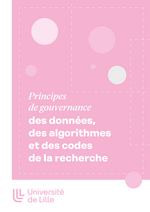Governance of research data, algorithms, and source code
In 2025, the University of Lille adopted a governance policy for research data, algorithms and source code.
This document, approved by the Scientific Council on 6 March 2025, formalises the principles of governance and the roles of the various stakeholders within the University. It is available in French only.
The University's data governance is based on five principles:
| 1 | Data, algorithms and source code must be shared and reused in accordance with scientific values. |
| 2 | Data must be Findable, Accessible, Interoperable, and Reusable (FAIR). |
| 3 | Data must be as open as possible, as closed as necessary, and described in all cases. |
| 4 | The specific characteristics of source code and software must be recognised. |
| 5 | The issues of digital sobriety must be taken into account. |
Following the publication of the Principles of governance for research data, algorithms and source code, several more practical recommendations were added to the University's policy:
- Recommendation #1 : Using software forges (French only)
- Recommendation #2 : Archiving research source code on Software Heritage (French only)
Research Data Governance Unit
This policy was developed under the leadership of Julien Roche, Administrator for Research Data, Algorithms and Source Code (Administrateur des données, des algorithmes et des codes de la recherche, or ADAC) for the University of Lille, by a working group composed of the University's research data stakeholders.
The Research Data Governance Unit is made up of various data stakeholders at the University of Lille. Through their expertise (functional or disciplinary), they represent the various issues of data, source code and algorithm governance:
- University libraries (Service commun de documentation), including the coordination of the data management cluster.
- Personal data and archives Department, and the Data Protection Officer (DPO - DPD)
- Research Department, including economic and societal value creation
- Digital Department and Chief Information Security Officer (Responsable Sécurité des Systèmes d'information or RSSI)
- Research Ethics Committee and the Personal Protection Committee
- Scientific integrity advisor
- Defence and security officer
- PRADA (Personne responsable de l'accès aux documents administratifs, or Person responsible for access to administrative documents)
- Disciplinary experts and experts on platforms:
- Maison Européenne de Sciences de l'Homme et de la Société, or European Center for the Humanities and Social Sciences (social sciences and humanities),
- Plateforme universitaire des données de Lille, or Lille University Data Platform (social sciences and humanities),
- ICARE (environment),
- Bilille (bioinformatics).
The missions of the ADAC unit are specified in the mission letter from the President of the University:
- Propose a policy on the management, openness, sharing and promotion of research data, algorithms, and source code;
- Develop and obtain approval for governance principles on data, algorithms, and source code;
- Coordinate the implementation of this policy;
- Contribute to their adoption by the scientific community
The unit may also be called upon to meet to address difficulties encountered by a researcher at the University of Lille when these cannot be dealt with by data experts, concerning one or more aspects of research data management.

